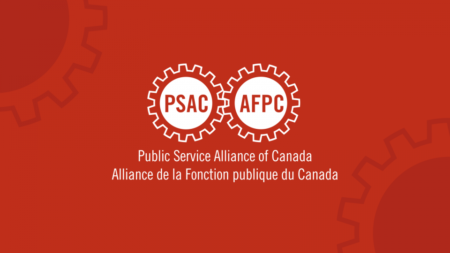In a unified action, Canada’s largest federal unions representing more than 270,000 federal public service workers have filed a series of legal challenges and will be taking action across the country in opposition to the Liberal government’s new mandate requiring its workers to report to the office three days per week.
The Public Service Alliance of Canada (PSAC), the Professional Institute of the Public Service of Canada (PIPSC), the Canadian Association of Professional Employees (CAPE), and the Association of Canadian Financial Officers (ACFO) are launching a united fightback campaign to oppose the government’s one-size-fits-all approach to hybrid work, which violates the hard-won rights of employees and fundamentally breaks the trust of workers and unions in this government.
“The decision to force workers back into ill-equipped and poorly maintained offices is purely political, and puts the services Canadians depend on at risk,” said Chris Aylward, PSAC national president. “The Liberal government props itself up as a friend of public service workers, yet at every turn they continue to ram through backroom decisions without any consultation that impact the well-being of workers and their families.”
“Workers feel betrayed, and we will be using every recourse we have available to fight this mandate and enforce a telework model that works for workers.”
The government was already struggling to implement its previous mandate requiring workers in the office two days a week due to the lack of adequate workspaces and proper tools for workers. In the federal budget, the government has doubled down by committing to sell half of all federal buildings, which will only put more strain on office space for workers.
“This isn’t just about an extra day in the office for workers,” added Aylward. “This misguided decision sets up workers to fail, pushing them into physical offices that don’t have enough workspaces, where they don’t have the right equipment to do their jobs effectively, only to spend their days on virtual calls with their coworkers who work all across the country.”
This week, PSAC filed a series of legal challenges against the government, and will also encourage members to file individual grievances to force this government to withdraw their mandate.
Letter to President of the Treasury Board
Joint letters calling for urgent action were sent to Treasury Board President Anita Anand and NPD leader Jagmeet Singh.
In the letter to Treasury Board President Anita Anand, these unions express their outrage and opposition to the recent, unilateral amendment of the government’s telework mandate.
We’re calling for immediate action and accountability on a number of issues including: lack of consultation and erosion of labour relations, the advisory process, the inability to implement policies, the impact on workforce productivity and well-being, and lack of trust and respect.
Letter to NDP leader
In the letter to NDP leader Jagmeet Singh, the same unions express their concern that the NDP continues to support a government that so flagrantly disregards the rights and well-being of workers. We ask the NDP to use their influence through the Liberal-NDP Confidence and Supply Agreement to hold the Liberal government accountable and champion the rights of workers.
Critical issue at the FB bargaining table
Since the mandate was announced, more than 26,000 PSAC members have sent letters to Treasury Board President Anita Anand and their MPs demanding the government withdraw its one-size-fits-all telework mandate on telework.
“This government better prepare for a summer of discontent,” said Aylward. “Workers are incredibly frustrated and outraged, at this government’s flagrant disregard for workers’ rights, and they’ll be taking to the streets and their workplaces in concerted, coordinated actions across the country.”
More than 50,000 members – nearly one third of all PSAC Treasury Board members – responded to our survey on the new mandate in just a few days, highlighting the widespread opposition to the policy change. Notably, 85% of respondents strongly oppose the three-day in-office mandate, with 90% prepared to take action against the government, and nearly half are prepared to give PSAC a strike mandate in the next round of bargaining over the government’s approach to telework.
PSAC members also overwhelmingly said the government’s increased in-office mandate would harm their ability to balance work and personal responsibilities (90%), their mental well-being (85%), job satisfaction (81%), and productivity and efficiency (78%) following the decision.
Telework is a critical issue at the bargaining table for 9,000 PSAC members at Canada Border Services Agency, who will wrap up strike votes for May 15. If an agreement isn’t reached on key bargaining issues including telework, fair wages and equitable pension reform, Canadians can expect major delays at border crossings and ports of entry across the country this summer.
Content in this article was first posted on the PSAC website.







